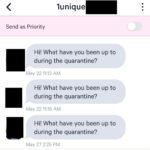h2>Dating : Becoming Human
Short Fiction
His world ended. Timothy Marston stared out the polished glass door of the investment bank. The bank had taken four years of his life.
No more.
He touched the cold surface, found his soon-to-be-deactivated key card, swiped, managed to inhale, stepped outside. Hands buried in his pockets, he turned to look a final time at that towering building; though it was 11 P.M., fluorescent light flooded from the square office windows stacked endlessly atop each other. The architecture was as obsessed with efficiency as its neurotic, money-driven inhabitants.
“It’s over,” he thought, “I’ve failed.” He had never failed before. Marston crumpled the termination letter, walked across Sixth Avenue, tossed it in the first trashcan he saw.
But the message remained. “We regret to inform you that we must terminate your employment at A.B. Edwards & Co. …” He felt a sting, a sting of rejection, though — of course— he knew he’d never had an actual relationship with his coworkers. The community had been much too transactional for the warmth and trust necessary for anything like friendship to emerge. It had, in short, been business — nothing more, nothing less.
He walked on, aimlessly and not caring that it was past midnight and snowing. Emotional pain has its benefits; it’s so strong that it blunts physical pain — even cold.
He thought of the last few years: What had all the manic work accomplished? Ill-health? An alcohol problem? Money he had no time to spend and no one to spend it on?
Yes, he was disoriented, not just internally but externally. Soon the Midtown high-rises melted away and only trees remained, stripped of leaves, bent by wet clumps of snow, yet sure to come back to life a few months. Although death takes life, life also takes death.
Marston glanced up and past the tangled branches at the glistening stars. He recalled a phrase— a quote from a time when he’d actually had time to read. “Life goes on.” He remembered another author’s advice, too: “Sometimes our lives resemble a fruit tree in winter. Who would think those branches would turn green again and blossom? But we hope it. We know it.”
Yes, all death — of a career, a life, a philosophy — yields new life.
“But is there anything left to live for?” he wondered.
“You have me.”
His heart leapt.
“Me.” It was a female voice. At 1 A.M. in Central Park, and therefore probably a junkie, a bum, or a prostitute. Yet when she emerged from the darkness, when she stood before him, she seemed too delicate for any of that. She had an unconventional but beautiful look. Beautiful because it seemed to Marston that she shared a secret with him — one he was too dull to understand. “You have me,” she repeated.
Marston backed away. “What does that even mean?” he said, though he suspected he knew, though the realization straightened his posture and stilled the tears that glistened against the bright white moonlight and fell to the pale white snow.
She didn’t reply.
“Please.” His hand shot forward, seized her arm; suddenly he felt desperate. There had to be an answer. Either that, or there must be something or someone to blame. An answer more concrete than entropy. For a crazed instant he squeezed her skin until his knuckles hurt and turned white. He wanted answers. More than anything he needed them.
She stared at him. Something weighed heavily in her hazel-brown eyes — regret, disappointment. At what? That he couldn’t understand. But then she gave another clue: “My name is Human. And that’s what you have. Me. A human. You’ve been alone for so long — a psychic island, surrounded by other islands, and all of you too afraid to make a bridge — that you’ve forgotten our togetherness.” She melted into the snow-bent trees.
Human? He stood for ten or fifteen minutes, gazed blankly at his feet. What had happened seemed a dream. Was a dream? Maybe he’d gone mad. Still, the mystery furnished relief from the day’s troubles, gave his mind something else to dwell on. Was he so distraught that he was exaggerating the words of a homeless woman, treating marijuana-inspired wisdom as the real thing: Truth? Or had she said something fundamental? Something about what’s truly valuable?
Timothy stood and wiped his coat. The swirling snow seemed infinitely unlike his former office’s efficient rows of cramped cubicles . For the snow had no hierarchy — no corner offices, no window views, etc. He felt for once that he could simply … be. For so long, he’d been so used to doing that he forgot the pleasure of being. He stood like that a long time. Motionless.
When he left Central Park for his apartment he saw his doorman. “Hi,” he said, acknowledging the man for the first time … well … ever.
The worker — Walter?— perked up his head, raised his bushy grey eyebrows. His tired brown eyes twinkled. “Well, well,” he said, chewing on the words. “Hello to you too, Mr. Marston.”
“Please,” Marston said. “Just Tim.”
Marston’s heart swelled with something then. That something felt hot and alive and out of place. It rose through his belly, grasped his heart, clutched it tight as he ascended the elevator to the seventh floor. He hadn’t felt this thing for years. He shivered. Whatever the feeling’s origin, it felt invigorating. What was it? A coincidence? Or had he rediscovered his childhood self, a self where status and heuristics of prestige and wealth mattered naught, a world where everyone was human — worthy of dignity — and a world where relationships trumped everything else?
The feeling departed when he entered his studio. He collapsed on his bed and felt sleep begin to clutch him. Just before consciousness slipped, though, a hungry and desperate thought seized his mind: I must see Human again. Tomorrow.



